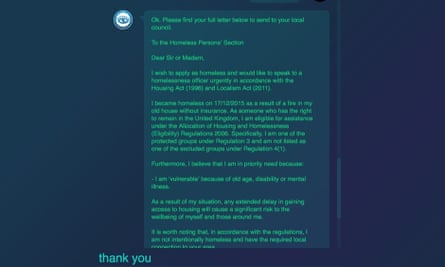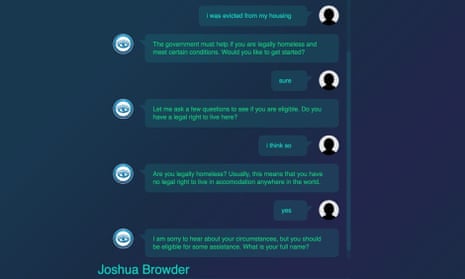The chatbot lawyer that overturned hundreds and thousands of parking tickets is now tackling another problem: homelessness.
London-born Stanford student Joshua Browder created DoNotPay initially to help people appeal against fines for unpaid parking tickets. Dubbed “the world’s first robot lawyer”, Browder later programmed it to deal with a wider range of legal issues, such as claiming for delayed flights and trains and payment protection insurance (PPI).
Now, Browder, 19, wants his chatbot to provide free legal aid to people facing homelessness. He said: “I never could have imagined a parking ticket bot would appeal so much to people. Then I realised: this issue is bigger than a few parking tickets.”
In an interview with the Washington Post, the 19-year-old said he decided to expand the bot’s capabilities after DoNotPay began receiving messages about evictions and repossessions. In February this year tenant evictions reached the highest on record.
He said: “I felt bad that I didn’t have the knowledge to personally help people, especially since they were being made homeless.”
The bot asks a few questions about people’s circumstances, such as whether they live in the UK, whether they are legally homeless and how they became homeless. Using their details, it figures out the best way to help the person.

Most commonly, this means drafting a legal letter that the person using the chatbot can send to their local council to apply for emergency housing.
Browder says he used data gathered via the Freedom of Information Act to figure out trends in why public housing applications are approved or denied, as well as from a team of volunteer lawyers. This is so the bot can create the best possible application for each individual.
Since the bot was launched on Wednesday, Browder says he is already seeing people using it to help with their housing issues. He’s also in touch with housing charities in the UK and further afield.
Centrepoint, a charity in the UK for young homeless people, is among them. Gaia Marcus, the manager of its youth homelessness databank, welcomed Browder’s project.
“You can’t overstate how important it is that this technology is built with an understanding of the social issue it’s addressing,” she said.
“Many of the young people Centrepoint work with would have been in terrible situations for several months before they came to the realisation they were homeless and that’s just the first step.”
The charity’s databank found only 13,000 out of 130,000 young people in England who went to their local authority because they were homeless were successful in receiving statutory support.
“The fact is, it’s easy to turn away a young person who doesn’t know what they’re entitled to.” added Marcus. “It’s those turned away that any app really needs to reach out to.”
Currently, the chatbot is only available in the UK, but Browder hopes to expand, especially to New York and San Francisco. He said: “The issue of homelessness is universal, but the reasons behind it are different depending on where you are.
“I don’t think I could just replicate this in San Francisco, for example. I’d have to work on something different.”
